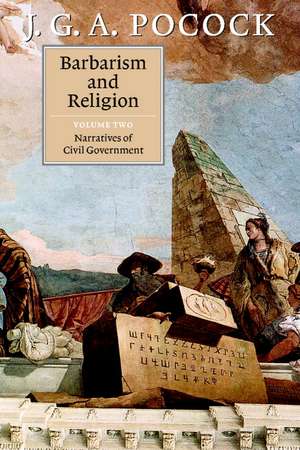Barbarism and Religion: Barbarism and Religion 2 Volume Paperback Set
Autor J. G. A. Pococken Limba Engleză Paperback – apr 2001
| Toate formatele și edițiile | Preț | Express |
|---|---|---|
| Paperback (2) | 311.86 lei 6-8 săpt. | |
| Cambridge University Press – apr 2001 | 311.86 lei 6-8 săpt. | |
| Cambridge University Press – apr 2001 | 316.49 lei 6-8 săpt. | |
| Hardback (2) | 527.10 lei 6-8 săpt. | |
| Cambridge University Press – 6 oct 1999 | 527.10 lei 6-8 săpt. | |
| Cambridge University Press – 6 oct 1999 | 762.47 lei 6-8 săpt. |
Preț: 316.49 lei
Nou
Puncte Express: 475
Preț estimativ în valută:
60.56€ • 63.23$ • 50.12£
60.56€ • 63.23$ • 50.12£
Carte tipărită la comandă
Livrare economică 05-19 aprilie
Preluare comenzi: 021 569.72.76
Specificații
ISBN-13: 9780521797603
ISBN-10: 0521797608
Pagini: 440
Dimensiuni: 154 x 229 x 28 mm
Greutate: 0.69 kg
Ediția:Revised
Editura: Cambridge University Press
Colecția Cambridge University Press
Seria Barbarism and Religion 2 Volume Paperback Set
Locul publicării:Cambridge, United Kingdom
ISBN-10: 0521797608
Pagini: 440
Dimensiuni: 154 x 229 x 28 mm
Greutate: 0.69 kg
Ediția:Revised
Editura: Cambridge University Press
Colecția Cambridge University Press
Seria Barbarism and Religion 2 Volume Paperback Set
Locul publicării:Cambridge, United Kingdom
Cuprins
Introduction; Prelude: the varieties of early modern historiography: Part I. Constructing The Enlightened Narrative: Section I. Pietro Giannone: Jurist and Libertin in the Central Mediterranean; 1. Civil and ecclesiastical history; 2. Popes and emperors: from the Isaurians to the Hohenstaufen; 3. Angevins, Spaniards and Gallicans: to the brink of enlightenment; 4. Gibbon and Giannone: narrative, philosophy, erudition; Section II. Voltaire: Neo-Classicst and Philosophe in the Enlightened World-Picture; 1. On the horizons of Europe: the kings of the north; 2. Courtly monarchy as the instrument of Englightenment: the Siecle de Louis XIV; 3. Asia and the dechristianisation of history: the Siecle and the Essai sur les Moeurs; 4. The Christian millennium in Europe: the Essai sur les Moeurs; 5. The recovery of civil government, the rebirth of fanaticism, and the return to the Siecle; 6. Voltaire: the exasperating predecessor; Part II. The Historical Age and the Historical Nation: Section III. David Hume and the Philosophical History of England; 1. The problems of history in the Hanoverian kingdoms; 2. David Hume: the Essays as contemporary history; 3. The History of Great Britain: Hume's modern history; 4. England under the House of the Tudor: monarchy, Europe and enthusiasm; 5. Hume's History of England: the Enlightened narrative in retrospect; Section IV. William Robertson and the History of Europe; 1. The problems of history: the Scottish perspective; 2. Scotland and the progress of society; 3. The Reign of Charles V and the emergence of the European States; 4. Robertson: histories written and unwritten; Part III. The Progress of Civil Society: Section V. Adam Smith: Jurisprudence into History; 1. Moral philosophy and the stages of society; 2. Smith's Glasgow lectures: narrative and philosophical history; Section IV. Adam Ferguson: the Moderate as Machiavellian; 1. Ferguson's Essay: Siberia as the cradle of World history; 2. The Memoires Litteraires and the Remains of Japhet; 3. Scottish narrative: theoretical and civil history; Part IV. Intending the Decline and Fall: 1. The Enlightened narrative and the project of 1776; 2. 'Gibbon's dark ages:' the writings of 1765–72; 3. Beginning to write: the evidence of the autobiographies; Bibliographies; Index.
Recenzii
'Pocock manages to place Gibbon within these larger cosmopolitan movements without diminishing the historian's extraordinary accomplishment.' Tim Breen, New York Times Review of Books
'Pocock the historian of political thought has not been altogether useless to Pocock the historian of Gibbon's Roman Empire.' Peter Burke, European Legacy
'… the grandeur of Pocock's conception amazes, but it is often the asides and apercus that linger longest in the mind.' David Armitage, Lingua Franca
'Thus we come back to the English Protestant Enlightenment and the point from which John Pocock set out on his magnificent tour de force.' Nicholas Tyacke, The Times Literary Supplement
'Pocock the historian of political thought has not been altogether useless to Pocock the historian of Gibbon's Roman Empire.' Peter Burke, European Legacy
'… the grandeur of Pocock's conception amazes, but it is often the asides and apercus that linger longest in the mind.' David Armitage, Lingua Franca
'Thus we come back to the English Protestant Enlightenment and the point from which John Pocock set out on his magnificent tour de force.' Nicholas Tyacke, The Times Literary Supplement
Descriere
A major new sequence of works from one of the world's leading historians of ideas.

